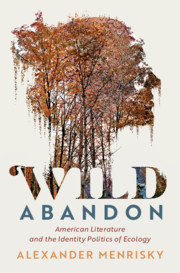Book contents
- Wild Abandon
- Cambridge Studies in American Literature and Culture
- Wild Abandon
- Copyright page
- Contents
- Acknowledgments
- Introduction Modern Environmentalism’s Identity Politics
- Chapter 1 The Ecological Alternative
- Chapter 2 The Entheogenic Landscape
- Chapter 3 The Universal Wilderness
- Chapter 4 The Essential Ecosystem
- Chapter 5 The Death of the Supertramp
- Conclusion Ecological Consistency
- Notes
- Bibliography
- Index
- Recent Books in This Series (continued from page ii)
Chapter 3 - The Universal Wilderness
Race, Cultural Nationalism, and an Identity Politics for the State of Nature
Published online by Cambridge University Press: 26 November 2020
- Wild Abandon
- Cambridge Studies in American Literature and Culture
- Wild Abandon
- Copyright page
- Contents
- Acknowledgments
- Introduction Modern Environmentalism’s Identity Politics
- Chapter 1 The Ecological Alternative
- Chapter 2 The Entheogenic Landscape
- Chapter 3 The Universal Wilderness
- Chapter 4 The Essential Ecosystem
- Chapter 5 The Death of the Supertramp
- Conclusion Ecological Consistency
- Notes
- Bibliography
- Index
- Recent Books in This Series (continued from page ii)
Summary
“The Universal Wilderness” argues that environmentalist appeals to self-dissolution constitute a uniquely universal form of identity politics. It does so by situating these appeals in the context of identity-based movements that flourished in the 1970s through a reading of Toni Morrison’s Song of Solomon (1977). The novel pointedly juxtaposes two characters: one who caricatures the era’s Black nationalism and another who identifies with the ecological intricacy of his environment. This arrangement effects a comparison between two accounts of authenticity: the racial and the ecological, the particular and the universal. Such a reading enables a reevaluation of certain facets of postwar environmentalism. Appeals to self-dissolution join the rhetoric of authenticity that characterized Black Power with the sort of political universalism that such movements called into question. However, though Morrison represents ecology as a universal condition, she also critiques the notion that it might constitute an identity position. That position might serve only to enshrine as universal the colonial attitudes of white men, erasing the perspectives of women and people of color.
Keywords
- Type
- Chapter
- Information
- Wild AbandonAmerican Literature and the Identity Politics of Ecology, pp. 95 - 132Publisher: Cambridge University PressPrint publication year: 2020

